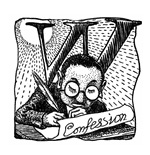
A Good Act of Contrition
GUEST COLUMN
During Holy Communion at a recent Sunday Mass, it dawned on me that the entire congregation in attendance, save one person, was going forward to receive Jesus in the Blessed Sacrament. There, at the front of the church, were the priest, a baldheaded man, and two women handing out the Holy Eucharist. Each parishioner, in turn, would accept the Host in his hand, put it in his mouth, and casually munch on the way back to his seat.
As I knelt observing this, my mind wandered back to my youth, growing up in St. Jerome’s Parish in the small town where I was “bread and buttered,” as the Irish say, in the pre-war Depression days.
Between Boy Scouts on Friday night, Saturday morning altar boy meetings, serving Mass on Sundays and holy days, weddings, and funerals, I spent quite a bit of time at St. Jerome’s. Then I thought of the phrase, “state of grace.” I remembered how five o’clock Saturday afternoon meant confession. After standing in a long line, I would finally enter the confessional and the priest would slide open the panel. I would then try to recall how often I had been disrespectful to or had disobeyed my parents, or when I’d lost my temper, or how many times I had taken the Lord’s name in vain. Then I would receive my penance, usually three Our Fathers and three Hail Marys, and Father would say, “Now make a good act of contrition.”
“Oh, my God, I am heartily sorry for having offended Thee, and I detest all my sins because I dread the loss of Heaven and the pains of Hell….”
You May Also Enjoy
Pope Francis sows confusion when he makes unconsidered or uninformed remarks during his in-flight press conferences, which are supposedly held in order that he might appear honest and transparent.
Like the heart of woman, wisdom needs to be won. It requires courtship and wooing, sincerity and purity of intention.
Cornered by the Market... Ivy League Culture Wars

